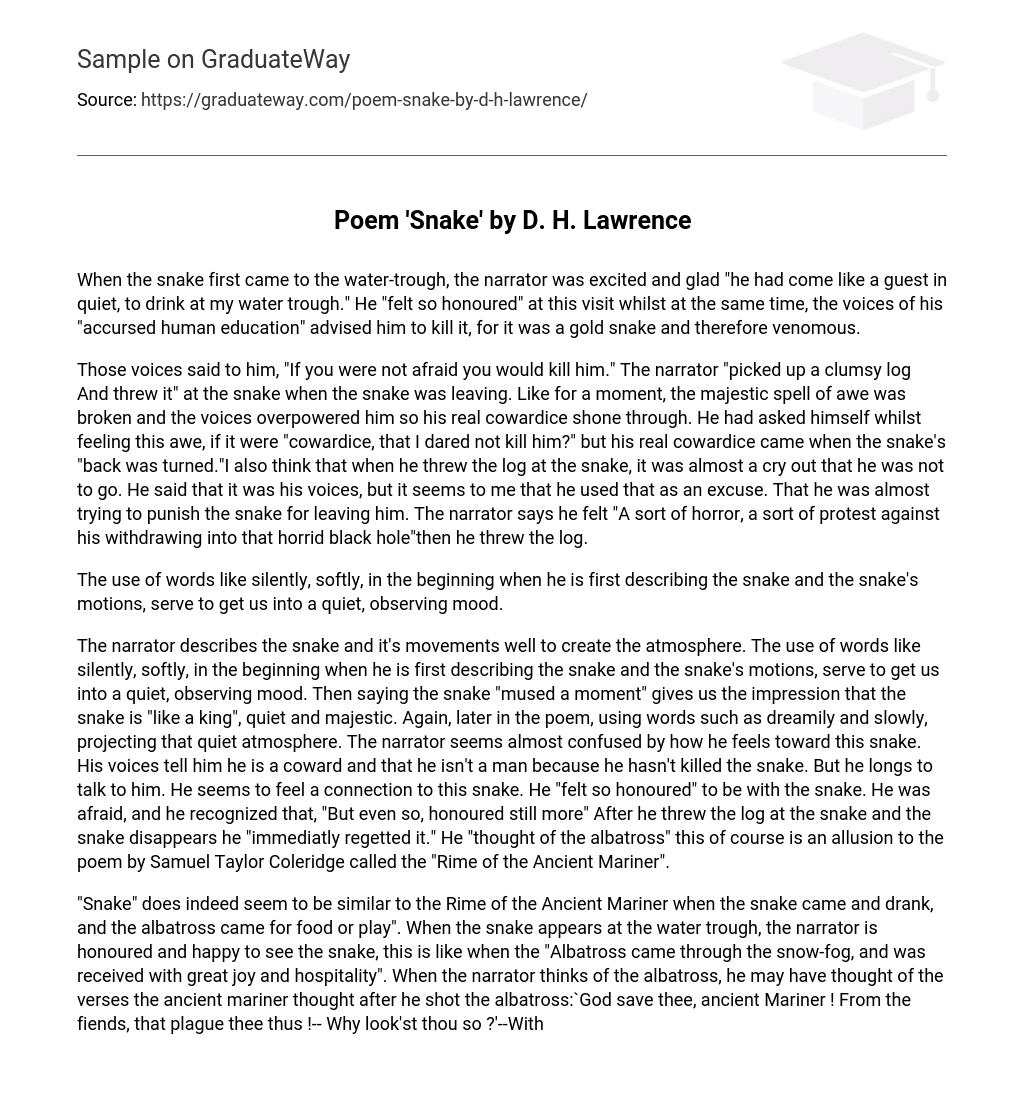The narrator felt excited and glad when the snake arrived at the water-trough. He viewed its visit as a guest peacefully coming to drink. However, conflicting thoughts emerged from the narrator’s human education, urging him to kill the snake as it was a venomous gold snake.
Those voices told him that if he wasn’t afraid, he would kill the snake. The narrator proceeded to hurl a clumsy log at the snake as it was leaving. In that moment, the majestic spell of awe was broken and the overpowering voices exposed his true cowardice. While feeling this awe, he questioned whether it was cowardice that prevented him from killing the snake, but his real act of cowardice came when the snake’s back was turned. I also believe that when he threw the log at the snake, it was almost like a desperate cry for it not to leave. He attributed it to his voices, but it seems to me that he used that as an excuse. It was as if he was seeking to punish the snake for abandoning him. The narrator admits to feeling horror and protest against the snake retreating into the dreadful black hole before hurling the log.
The author’s choice of words, such as silently and softly, at the beginning when describing the snake and its movements, help create a calm and observant atmosphere.
The atmosphere is created by the narrator’s skillful description of the snake and its movements. Through the use of words like silently, softly, and dreamily, the narrator sets a quiet and observing mood. The snake is portrayed as a majestic figure, akin to a king, as it “muses a moment.” This quiet atmosphere is maintained throughout the poem, with the narrator expressing mixed feelings towards the snake. His inner voices criticize him for not being courageous enough to kill the snake, yet he feels a connection to it and longs to communicate with it. The narrator feels honored to be in the presence of the snake, despite his fear. However, after throwing a log at the snake and making it disappear, he immediately regrets his action. The mention of the albatross alludes to the poem “Rime of the Ancient Mariner” by Samuel Taylor Coleridge.
The presence of the snake at the water trough reminds the narrator of the similar event in the Rime of the Ancient Mariner where a snake came to drink and an albatross appeared for food or play. Just like when the albatross came through the snow-fog and was received with joy and hospitality, the narrator feels honored and happy to see the snake. The thoughts of the ancient mariner after shooting the albatross, God save thee, ancient Mariner! From the fiends that plague thee thus!–Why look’st thou so?’–With my cross-bow I shot the ALBATROSS, may have crossed the narrator’s mind when thinking about the albatross.
And I had done a hellish thing, And it would work them woe: For all agreed, I had killed the bird That made the breeze to blow.
The poem is composed in free verse, capturing the awe-inspiring presence of a majestic snake as it drinks from a water trough. The poem effectively portrays the narrator’s realization and subsequent regret for their actions, manifested in a sense of self-disgust. It becomes evident that the narrator’s prejudices have ruined something extraordinary for them, emphasizing the importance of trusting oneself rather than succumbing to societal influences.





